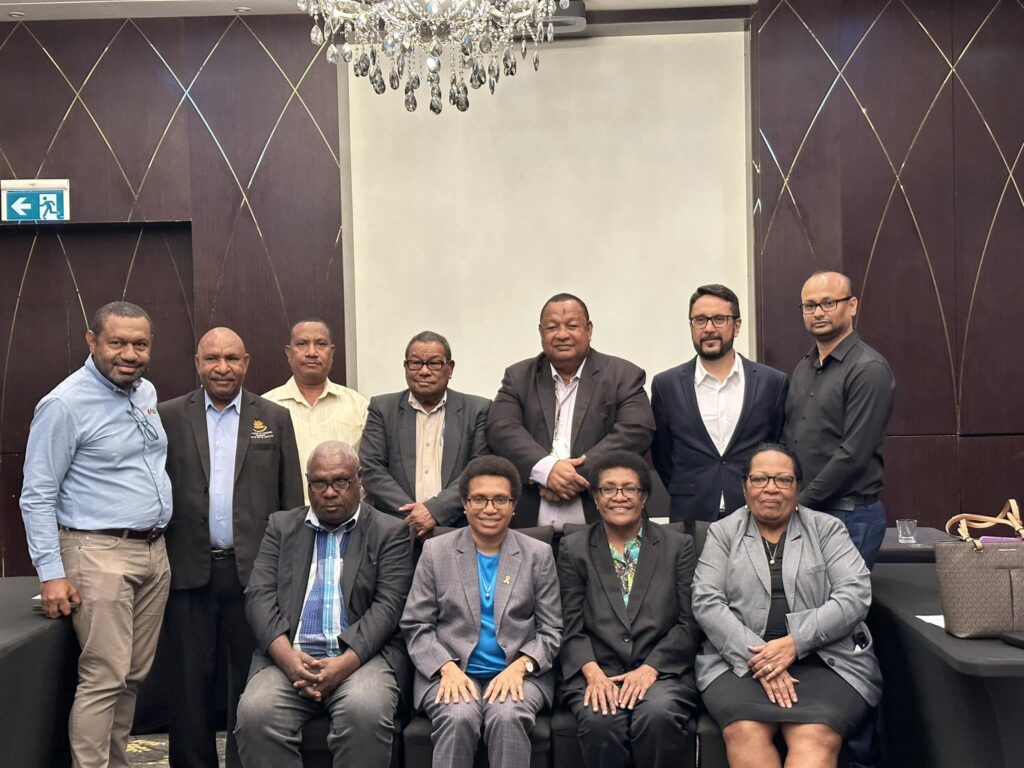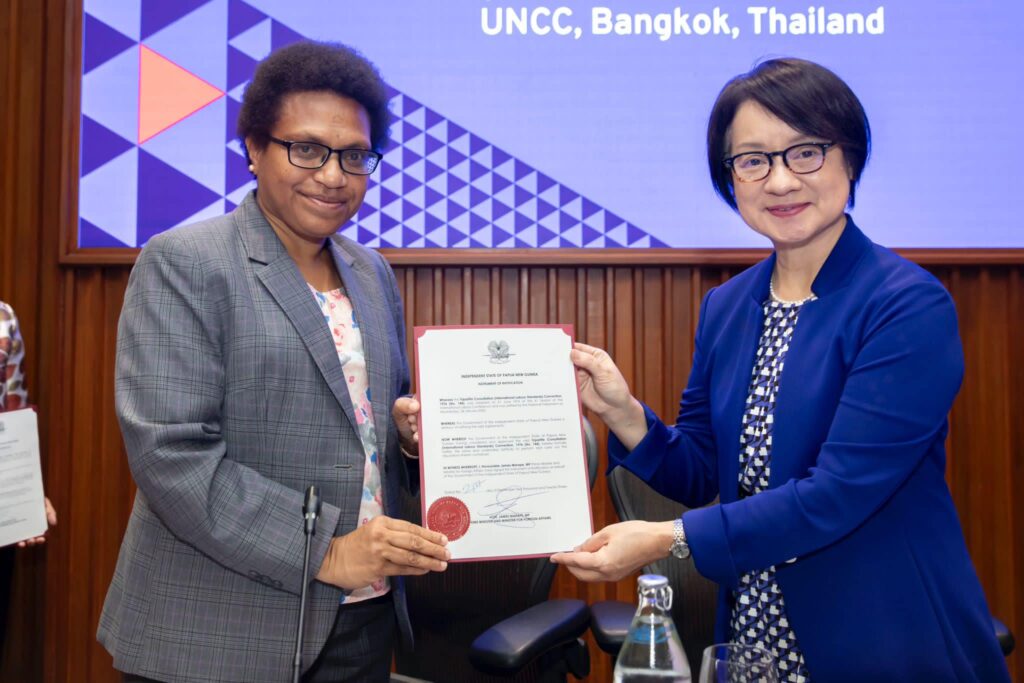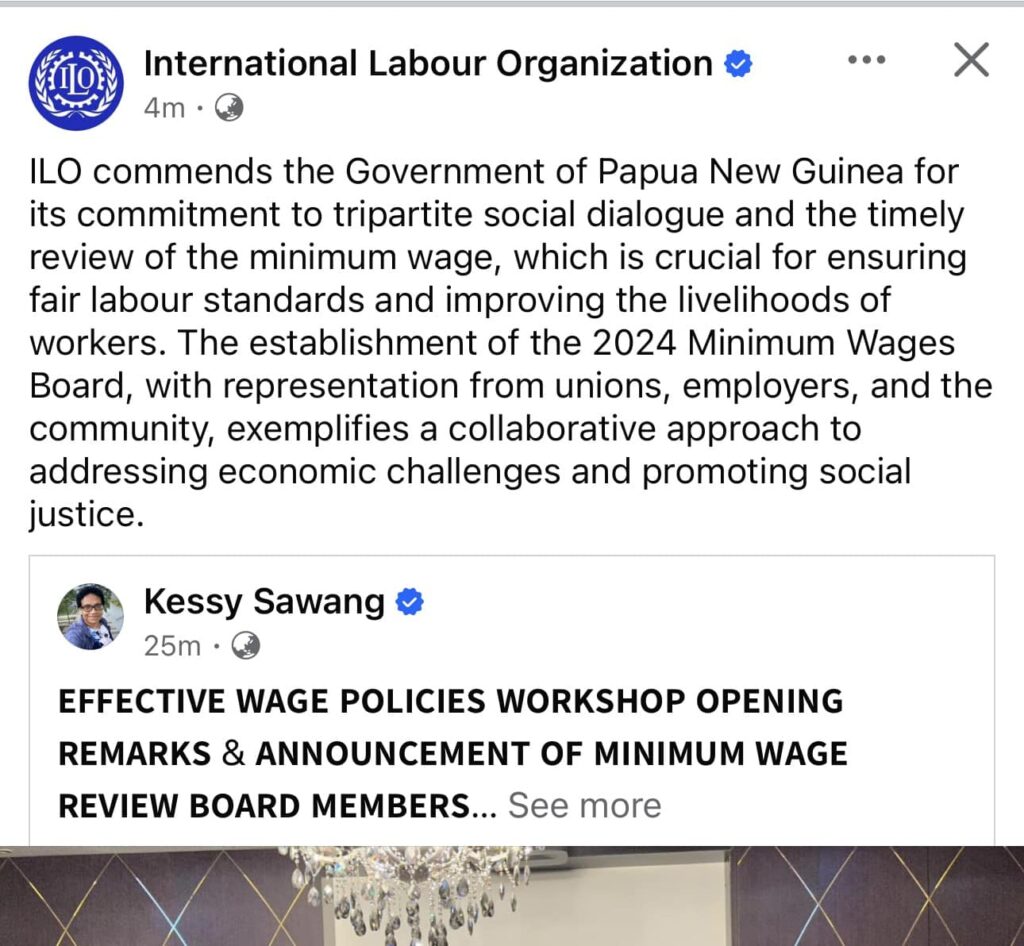𝗘𝗙𝗙𝗘𝗖𝗧𝗜𝗩𝗘 𝗪𝗔𝗚𝗘 𝗣𝗢𝗟𝗜𝗖𝗜𝗘𝗦 𝗪𝗢𝗥𝗞𝗦𝗛𝗢𝗣 𝗢𝗣𝗘𝗡𝗜𝗡𝗚 𝗥𝗘𝗠𝗔𝗥𝗞𝗦 & 𝗔𝗡𝗡𝗢𝗨𝗡𝗖𝗘𝗠𝗘𝗡𝗧 𝗢𝗙 𝗠𝗜𝗡𝗜𝗠𝗨𝗠 𝗪𝗔𝗚𝗘 𝗥𝗘𝗩𝗜𝗘𝗪 𝗕𝗢𝗔𝗥𝗗 𝗠𝗘𝗠𝗕𝗘𝗥𝗦
By HON KESSY SAWANG, MP, MINISTER FOR LABOUR & EMPLOYMENT
- Honouring Late John Paska
- Establishment of 2024 Minimum Wage Review
- Minimum Wage Review Board Members
- PNG's Ratification of ILO Convention No 144 – Tripartism and Social Dialogue
- MWB 100-Day Work Plan & Funding
- Context of 2024 Minimum Wage Review
- Tripartite Dialogue
- SDG 8 – Decent Work
- Evidence-Based Policy-Making: PNG's First Ever Labour Force Survey

Members of the 2024 Minimum Wage Board with Minister and ILO Officials – Lamana Hotel, Tuesday 24 September 2024
Ladies and Gentlement, good morning.
I acknowledge our social partners the unions – I see Anton Sekum and Raphael Waiyalaka from the TUC, our other social partner the employers I acknowledge Florence Willie and our colleagues from the ILO Raj Bimlesh and Xavier (HAVR-EE-AIR) Estupinan (ESS-TOO-PEE-NUN). Secretary of Department of Labour and Industrial Relations George Taunakekei and his officers, staff from across the public service particularly Departments of Treasury, National Planning, National Statistical Office. Finally, I acknowledge the members of the media that are here. A warm welcome to you all.
Honouring Late John Paska
Let me start by asking for a moment of silence to honour an important representative of our social partner, late John Paska who was a giant in the trade union movement.[Pause for 30 seconds before resuming.]
Establishment of 2024 Minimum Wage Review
Let me start with an announcement that that the Government has approved the 2024 Minimum Wages Board to review minimum wages in Papua New Guinea. This as you are all aware is overdue. The last minimum wage review took place 10 years ago and a minimum wage rate of K3.50 per hour was set and this has not adjusted since then.
I would like 2 outcomes from this workshop:
- The first is to assist members of the MWB to identify the various important factors when considering minimum wages and then to provide some guiding tools on how to consider these different aspects. This of course is not prescriptive but provides a framework for consideration, analysis and the Board’s independent decision.
- The second aspect is broader. We need to think about the system for minimum wages and how we can move from an ad hoc irregular system to one that is more structured both in terms of timing but also in being evidence based. I think you will agree that a pause for a decade is unacceptable – both for workers and indeed for employers too. I’ll come back to this a little later.
Minimum Wage Review Board Members
I am delighted to announce that Ms. Beverley Doiwa has been appointed as the Chairwoman of the MWB. Beverley has a long and distinguished career in the Department of Labour and Industrial Relations and chaired the previous Minimum Wages Board.
The 8 members of the 2024 Minimum Wages Board comprise a group of distinguished and outstanding Papua New Guineans that bring skills, experience and deep knowledge that will assist the Board in its hearings and deliberations.
The Board includes 2 members from each of the Government’s social partners – the employers and the workers or unions, a government representative and 2 community representatives:
From the unions we have:
• Mr. Anton Sekum, the Acting Assistant General Secretary of the Papua New Guinea Trade Union Congress and
• Mr. Raphael Waiyalaka, the Vice President, Papua New Guinea Trade Union Congress.
From the employers we have:
• Mrs. Florence Willie, the Executive Director, Employers Federation of Papua New Guinea; and
• Mr. Robert Nilkare, the is Country Manager of New Britain Palm Oil Limited;
From the Government we have:
• Mr. William Hapipai, Acting Executive Manager, Industrial and Employment Conditions, Department of Personnel Management; and
Community Representatives:
• Mr. Bugave Kada, who is the Church Representative. He is a member of PNG Council of Churches’ Executive Board and Executive Officer of Lifeline Papua New Guinea; and
• Mr. Joe Itaki – Youth Rep, Director General, National Youth Development Authority.
To each of the MWB members including the Chairwoman I congratulate them and I also thank them for agreeing to the appointment and for making their time available for this important and overdue review over the next 3 months.
When I brought the submission to Cabinet I was greeted with the words “Finally, the long overdue minimum wages review”. A decade is a long time and whilst I wanted to get this review underway quickly I wanted to ensure that this was done in a correct and responsible manner.
PNG’s Ratification of ILO Convention No 144 – Tripartism and Social Dialogue
Papua New Guinea early last year ratified ILO Convention 144. This convention deals with tripartite participation and social dialogue. It commits the Government, employers and workers to tripartite social dialogue around international labour standards governing all aspects of the world of work.

But I want to promote a culture of social dialogue on wider social and economic issues. I value our social partners and a collaborative approach with them. I ensured that the Terms of Reference for the minimum review was provided to our social partners – the employers and unions, for their input.
The Terms of Reference for the minimum wages review received prior endorsement through the formal mechanism for tripartite participation and dialogue – the National Tripartite Consultative Council. I want to emphasize that the TOR for the minimum wage through this forum was reviewed and approved by employers and the unions.
The NTCC was dormant for 5 years and I made it one of my key focus area to revive and reinvigorate this important consultation process reflecting our Government’s commitment to tripartite participation and social dialogue.
Almost exactly one year ago I presented the ratification instrument for ILO Convention 144 to the ILO in Bangkok, Thailand. The legislation establishing the NTCC prescribes it meets 2 times a year but I am pleased to report I have already convened three times this year with a further final meeting for this year planned for next month.
MWB 100-Day Work Plan & Funding
The Government has approved a budget of K4.9 million for the MWB. This is based on a 100-day work plan for the establishment, appointment, and the conduct of the 2024 Minimum Wage Board Hearings. The planned schedule for hearings will cover 21 centers in both urban and rural locations.
The Treasurer has allocated an initial funding of K2 million and I thank him for this. I also thank the Prime Minister for his strong support and his desire to have this review completed this year. We have listened to our social partners concerns about the acquittal of public funds spent on the last minimum wage and so Cabinet has approved the engagement of an external fund manager to oversight and manage the project funds.
Context of 2024 Minimum Wage Review
Let me provide some quick comments on the context for the minimum wage review. We know Papua New Guinea faces considerable development challenges such as high population growth with a significant youth bulge, low labour productivity, high-cost structures and poor health and education outcomes.
Together these have led to unequal opportunities for Papua New Guineans to participate in economic development and to benefit from economic growth.
We see from the Government’s National Budget documents, trend GDP growth over the period since the last minimum wage determination in 2014 to 2023 is estimated to be 2.4%. This has not kept pace with the NSO estimated population growth of 4.9% over the same period leading to a decline in real GDP per person and reduced living standards.
So each year per capita income (that is average income per person) has declined by 2.5%. Over the same period 2014-2023, prices, as measured by CPI inflation, has grown on average by 4.8% annually. This has resulted in purchasing power of minimum wage earners falling some 34% over this decade.
To explain what this means a little more clearly, today we can only purchase 66% of the basket of goods and services that it could in 2014. Or yet again in different words what we bought for K66 in 2014 we would need K100 today to buy the same items.
With the rising cost of living, the Government is not insensitive to the struggles of our people and we especially recognize the considerable hardship borne by minimum wage earners and their distress.
Tripartite Dialogue
Let me make it clear that the Government has not sought to make any unilateral decision on a new minimum wage rate. There is a process set out in law to review and set minimum wages. As I stated earlier Government has consulted with our social partners – the employers and the unions on the terms of reference and it was jointly agreed.
The composition of the MWB includes two members nominated by the employers and two members nominated by the unions – there is balance.
It will be the MWB that receives submissions and considers them and makes an informed decision about an appropriate level for minimum wages. It is the MWB’s decision or determination that will be presented to the Government within 4 months’ time.
Current formal sector employment levels, as measured by the Bank of PNG, are below 2014 levels suggesting growing economic inequality and greater vulnerability of low-income workers to poverty and hardship.
SDG 8 – Decent Work
The Government has an ambitious target under MTDP IV of creating 1 million jobs by 2027. Clearly, many of these jobs will be provided for by the informal economy. We must not understate the importance of the informal sector in absorbing the labour force in PNG. But therein lies one of our challenges.
Whilst minimum wages can contribute to poverty reduction, a broader and more careful suite of policy intervention by Government is required to ensure protection for low-income earners both within the formal and informal sector. I have a focus on creating decent work.
This is a goal under Sustainable Development Goal 8: Economic Growth and Decent Work. I have a concern with the high level of informal work in PNG both in the formal sector and the informal sector.
Minimum wages only provides a wage floor for workers in the formal labour market, which my Department regulates. The Government’s concern is with the large numbers of informal workers both in the formal sector and the informal sector.
I plan to announce initiatives to facilitate the transition from the informal sector to the formal sector. Today’s workshop is the start of a process of a broader review of our minimum wages systems and wages policies. We can’t wait a decade before we review minimum wages.
We need a regular minimum wage fixation system that relies on hard evidence to facilitate informed decisions on minimum wages that is adequate for workers but responsibly takes into account our social and economic circumstances.
Evidence-Based Policy-Making: PNG’s First Ever Labour Force Survey
For evidence-based policy and decision making, I have commissioned Papua New Guinea’s first ever labour force survey. This was originally planned to be conducted this year but has now been pushed to 2025 as we must wait the completion of the 2024 Population Census.
The Government I am pleased to announce has allocated K20 million for this survey in the 2024 National Budget. I am also pleased that the scope of the Labour Force Survey was endorsed at the NTCC. Even though this formed part of the Decent Country Work Program I insisted that our social partners be consulted and their formal endorsement secured. I will ensure that our social partners are members of the Project Steering Committee Labour Force Survey.
The labour force survey will align with the latest international labour statistics standards and the questions will collect data on:
• Demographic Information: age, gender, marital status, household composition, education level, and other socio-demographic characteristics of individuals in the labor force;
• Employment Status: whether individuals are employed, unemployed, or inactive in the labor force; employment type (full-time, part-time, temporary), sector of employment (agriculture, industry, services), and employment status (employee, self-employed, employer);
• Industry and Occupation: Information about the industry and occupation of employed individuals including those in agriculture and fishing;
• Hours of Work and Earnings: Currently this is not incorporated but questions about hours worked, overtime, and earnings will be considered as they are valuable indicators;
• Unemployment: unemployment status, duration of unemployment, reasons for unemployment, and job search activities;
• Underemployment: individuals who are employed but seeking additional work or are working below their skill level or desired hours;
• Labour Force Participation: Information on labor force participation rates by age, gender, and other demographic characteristic;
• Education and Training questions related to educational attainment, training participation, and skill development provide insights into the relationship between education, employment, and labor market outcomes;
• Informal Employment: Questions on work that is not covered or regulated by formal labour laws and regulations;
• Occupational qualifications and skills mismatch amongst employed persons; and
• Time use: data about how individuals allocate their time across various activities on a given day to provide insights into the patterns of time use among different population groups and gender, and to understand the distribution of time between paid work, unpaid work, leisure activities, and other responsibilities.
A household income and expenditure survey will also be conducted in 2025 by NSO. The primary goal is to rebase the Consumer Price Index (CPI) and to improve compilation of GDP estimates. Importantly, this will establish poverty lines for PNG.So we will have two surveys next year that will provide information on living standards and on earnings.
We need to understand how minimum wage rates will tackle poverty but we also need to understand the distribution of earnings and how minimum wages will address earnings inequality.
With these introductory remarks I am pleased to declare this workshop open. I now will allow our social partners to make some remarks followed by an ILO representative and finally the MWB Chairwoman.
